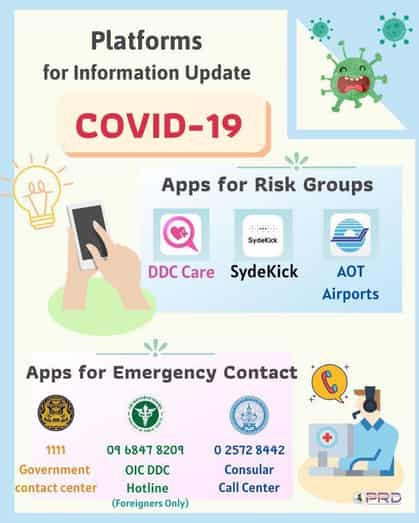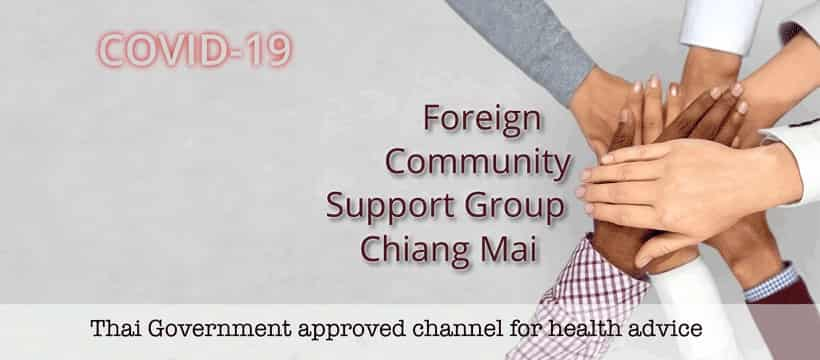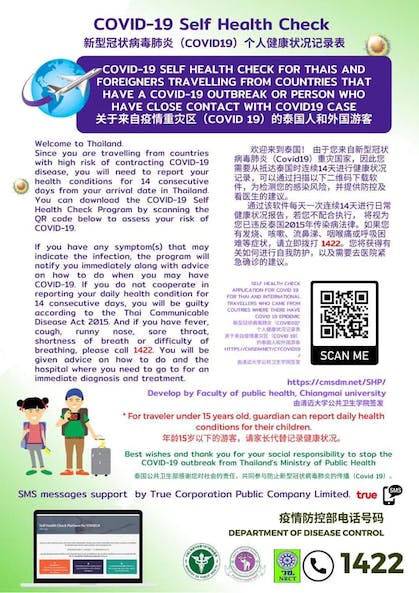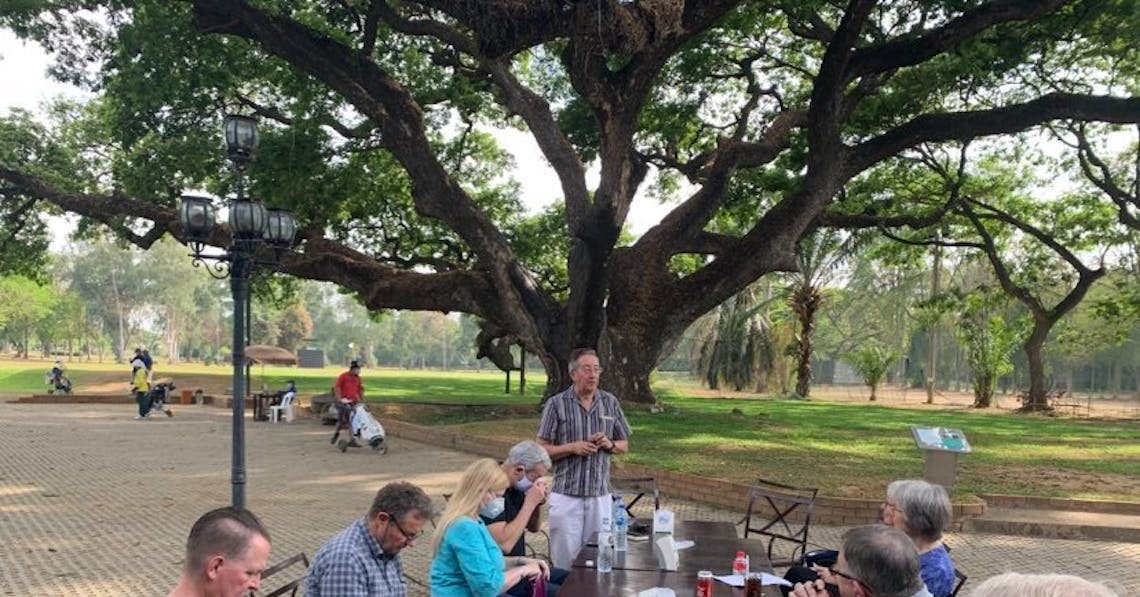As the city was heading home to begin our self-quarantines on a quiet Friday two weeks ago, a group of foreign nationals met up under the giant rain tree at the Chiengmai Gymkhana Club. Under discussion was a support system for the tens of thousands of expatriates living here, many of whom are vulnerable and may need support during these COVID-19 days.
It was initiated by Ben Svasti, Honorary British Consul and head of the Consular Corps, at the request of Charoenrit Sanguansat, Governor of Chiang Mai. I turned up to join the group as a representative of the English language media, as did representatives from the Irish and Portuguese consulates, the First Church of Chiang Mai, the Expat Club, Lanna Care Net and McKean Rehabilitation Centre as well as a medical doctor and a search and rescue expert from Canada.

Svasti had already formed a Facebook page, called COVID Foreign Community Support Group which he was running with guidance from the Director of the Centre of Communicable Diseases. But with a multitude of fulltime jobs already keeping him busy, Citylife offered to take over communications, initially redesigning the Facebook page, finding content generators and working on editorial standards. The COVID Foreign Community Support Group is a lean, but very important, source of information which only features COVID-19-related news and information relevant to Chiang Mai and the north of Thailand and is aggregated only from highly reputable sources.
“The crisis isn’t here and we are all hoping it won’t arrive,” said Svasti about the group. “But if it does arrive, the Chiang Mai foreign community is prepared.”
“We are looking towards a future which we really hope isn’t going to take place”
“We are looking towards a future which we really hope isn’t going to take place, planning for a worst case scenario,” continued Svasti. “In that scenario, the central government’s health facilities will be overstretched. It is estimated, from many sources inside and outside Thailand, that 80% of people who catch Coronavirus will have mild symptoms and recover at home and only 20% will have serious symptoms such as difficulty breathing and require hospitalisation. We are strengthening the ability of the foreign community to cope with the pandemic and provide support to one another by organising into sectors with their own leaders, making it easier for Thai government agencies and embassies to reach down to help them.”
Under Svasti’s guidance, the group now has a Health Advisory Committee comprising Thai doctors from Suan Dok hospital, a former representative of Thailand to the World Health Organisation and a team of doctors from ChivaCare. So far there have been few medical needs, but the committee will soon be publishing an FAQ with a variety of medical advice approved by the Ministry of Public Health. “We are guessing that many foreign nationals are going to be vulnerable in the worst case scenario,” added Svasti. “They can’t speak the language, may be unfamiliar with the culture, and may find it harder than Thai nationals to access national health services. So our mission is to act as a bridge between Thai government services and foreign nationals on community levels.”

Information was critical, but it soon became apparent that more was needed.
Canadian Robert King has over a decade of expertise in setting up such support systems for some of Canada’s search and rescue needs, and soon showed himself to be invaluable. He had previously set up the Chiang Mai Search and Rescue page and it was decided that this group, run by King, would be in charge of operations while the overarching COVID Foreign Community Support Group, overseen by Svasti, would be the main channel of communication with Chiang Mai’s foreign residents.
“The group has exceeded all of my expectations,” said King. “That first day before I got to the Gymkhana Club I thought we would get 30 maybe 50 people to help. But after meeting Ben, and after you ran that article in Citylife, it exploded and we now have 334 helpers. We work with the Expat Club team, the Free Burma Rangers, multiple groups. We even have a plane now, though I am not sure what we are going to do with it! All in all I think there are about 1,000 people involved and helping out in one capacity or another.”
King’s army of helpers have kindly offered to pickup and deliver food, medicine and other necessities to deliver to the old, the infirm and the vulnerable. They are also busy setting up basic – and remote – training for helpers to ensure their safety and wellbeing as well as how to work at maximum efficiency if and when the time comes.
King has also corralled all the community groups across Chiang Mai under one umbrella and everyone is doing their best to reach out far and wide to get the foreign community to join their local chapters.

Thankfully, a decades-long British resident, who asked not to be named, has stepped up to take charge of communications. He…let’s just call him CommsHQ, said, “My work is managing teams spread out across Europe, so I am very familiar with how remote teams collaborate and communicate. Initially I was going to form a neighbourhood group, but now I am finding myself linking multiple neighbourhoods together.”
CommsHQ has also streamlined internal communications. Ten days ago there was a loose group of a couple of dozen people who were sending emails, Facebook messages, LINE chats and direct messages to each other in a highly inefficient mess, causing endless frustrations, communication errors and time wasting.
“People were lost and left out,” said CommsHQ, “I centralised the system and built a structure so that everyone was encouraged to be on the same platform, the same page, and soon we were communicating together the same way, seamlessly. The entire group is now building a comprehensive crisis response network with data protection and addressing issues concerning consent, data privacy while also controlling information flow, and matching resources with appropriate solutions. There is a lot of channelling that needs to be done, it’s a surprisingly large project.”
“We went on the principal of building it fast, then adapting it as we moved forward and it’s working. The challenge is to build a system as we go for a unique situation with no precedent. Normally you would specify what you are trying to do and spend a long time on that process. My challenge has been watching this phenomenal growth and keeping everything together, anticipating what may happen and coming up with a plan. This is building as needs develop. I believe in another week’s time we will have the crisis response network that we need if things go bad. I don’t know any project I’ve worked on that’s been more important.”
Svasti agrees that this is an extraordinary undertaking. “I am totally amazed at our group. In my ten plus years as consul, I’ve never seen the foreign community come together with this kind of helping spirit. I am so proud of not just the team, but the entire community. The work that Robert has done in preparing our operational structure, what CommsHQ has done in organising our communication channels and what Gemma is doing in drawing people together is, frankly, incredible.”
Gemma Passant, another Brit, has spent her corporate career taking in, processing and organising large amounts of information. Initially she offered her help to run her local community group, but today finds herself head of 13 community groups which is reaching 1,400 foreign residents…and counting.
“The amount of people who have contacted us and said, ‘let me help you’, has been amazing. This experience has been rewarding because I have never experienced anything like it in my entire life. Our huge challenge is the unknown. We want to make sure that people are cared for and that we have platforms, places, mechanisms and helpers ready to match their needs. I would say that we are almost ready for this. Right now we need more community leaders in our core groups because while everyone involved has been wonderful, we are overstretched. We need Facebook admins and community helpers.”
“It’s all about strengthening communities,”
“It’s all about strengthening communities,” added Passant. “Chiang Mai has communities and sub communities, but I have never seen such a cross section of communities coming together. I genuinely believe that these groups will continue after this is over.”
In the meanwhile I urge you all to regularly visit the COVID Foreign Community Support Group for the latest updates and news as well as join your local community support group should you need any assistance and also if you can offer some.
I would like to echo what Ben Svasti said. Having lived here for most of my life and worked within the expatriate community for over two decades, I am simply in awe of the strength and generosity of our community. The foreign residents of Chiang Mai have not simply hunkered down and hoped for the best. You have stepped up, reached out and worked hard to ensure that we are all going to come out of this with what I hope will be good health and a new found love and appreciation for our Chiang Mai community.
⭐ Sign up now to become a HELPER and support the Chiang Mai foreign-national community during the #coronavirus event. This is the perfect way to help your neighbours and wider local community. You can choose from a handful of Helper roles, including one that you can do remotely from your home.
➡ SIGN UP TO BE A HELPER https://forms.gle/hBU7GLiQcuxYuhTi7
⭐ Are you looking for ADDITIONAL SUPPORT or may have some concerns about your health or being affected by coronavirus? No matter big or small (from delivering groceries to having regular check-in calls etc), we, as a community, are here to help! Please complete this form to register for potential support in the Chiang Mai community during the COVID19 event.
If you know someone that’s not on Facebook and may need support, please submit the form (with their consent) on their behalf so we can keep in touch & support them 🧡
➡ SIGN UP FOR ADDITIONAL SUPPORT https://forms.gle/bxJUwBiPi9jBoeB89
